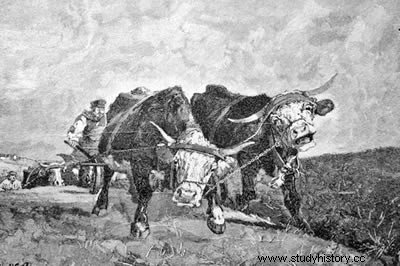By Tales Pinto
During the 14th century, western Europe experienced a period of crisis in the feudal regime, resulting in new social problems for this society in profound transformation. One of these social crises was linked to the peasant revolts against the nobility, as a result of the intensification of exploitation to which they were subjected.

The intensification of servile obligations, expanding the exploitation of peasants, led to the outbreak of Peasant Revolts in the 19th century. XIV
By the end of the 13th century, signs of economic and demographic decline were becoming clear in Western Europe. Climatic factors, such as rainfall and soil depletion, due to the use of techniques that did not replace the nutrients removed by agricultural crops, led to a sharp drop in production.
This decrease in production made the nobles intensify the exploitation of menial labor. As this exploitation was carried out through working time on the lands of the lords, the intensification of this work resulted in more hours of work on these lands and less work on the lands used by peasants to produce food for their subsistence.
Added to this situation was the occurrence of the Black Death in the 1340s and 1350s, which decimated the western European population. It is estimated that 2/3 of the inhabitants of cities contracted the disease and 70% of these died. In the field, the occurrence was less intense, but it did not cease to exist.
These factors generated social instability, which resulted in revolts by the exploited classes against their exploiters. In the cities, an example can be found in the Revolt of the Ciompi (wage workers in the textile sector), which reached its peak in Florence in 1378, when the workers came to overthrow the power of industrialists and bankers.
But it was in the countryside that the revolts were most acute. The jacqueries , revolts led by French peasants, were the most notorious case. The term derives from a French expression, Jacques Bonhomme , which means Jacques, the simple, a pejorative form used by the French exploiting classes to designate the peasants, which in Brazil would correspond to João Nobody.
In 1358, French peasants rose up with weapons in their hands against the nobles and clergy, in a fight against the intensification of exploitation. The peasants' action against their enemies was violent, as was the repression of the ruling classes against the uprising. About 20,000 peasants died in the jacqueries .
In England, in 1381, the peasants revolted against the increase in taxes on serfs, against the fixing of wages and against the return of the obligation of the serfs to remain on a given property. . Peasant groups even marched on London, destroying buildings and calling for reforms.
Although these revolts were defeated, they signaled the beginning of the end of serfdom in Western Europe and the disintegration of the feudal world, as a result of the social transformations they generated. It would be the beginning of the transformation of these peasants into future proletarians, which, combined with the centralization of the State and the expansion of trade with the outside of Europe, would make it possible to create the necessary conditions for the development of the capitalist mode of production.
test test test
